
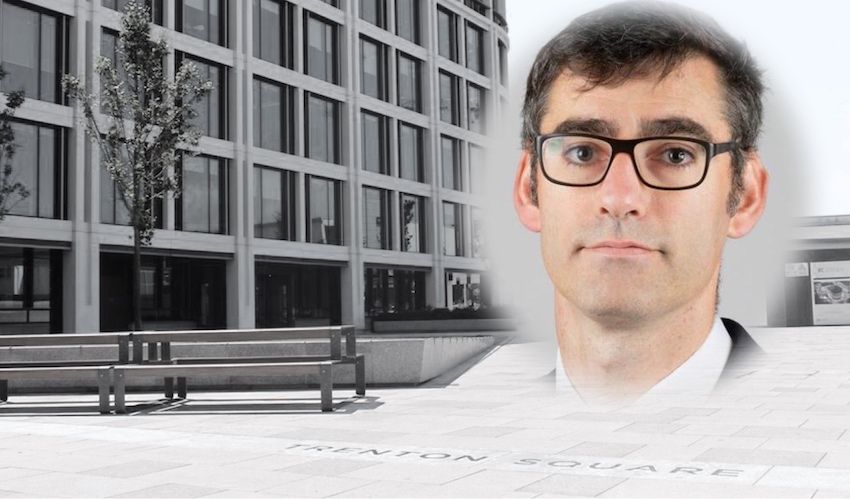

Jersey's politicians are to be asked to rename a local square after the West African country of Benin, as a way of acknowledging the island's links with the slave trade.
St. Brelade Deputy Montfort Tadier’s proposals come as several statues linked with slave trade have been toppled in the UK amid growing support for the Black Lives Matter movement.
In Jersey, the statue of Sir George Carteret in St. Peter was covered in paint last week amid calls for it to be removed due to the naval privateer’s links with the slave trade.
Meanwhile, around 1,000 people have signed a Change.org petition for the statue to be removed, and for Trenton Square, part of the International Finance Centre development, to be renamed.
Pictured: Trenton Square was inaugurated in 2018.
Inaugurated in 2018, the square celebrated links between Jersey and New Jersey, whose capital is Trenton.
However, that city draws its name from William Trent, who both traded and owned slaves.
The link was raised as an issue at the time of the square’s unveiling, but a change of name was not supported.
A separate e-petition launched on Monday has gained over 510 signatures.
But, contacted by Express, St Helier Constable Simon Crowcroft maintained his view that the Trenton name should not be changed.
He reminded islanders that St. Helier and Trenton are twinned, and proposals for the twinning were adopted by the Parish Assembly 60 to two, with no one speaking against them.
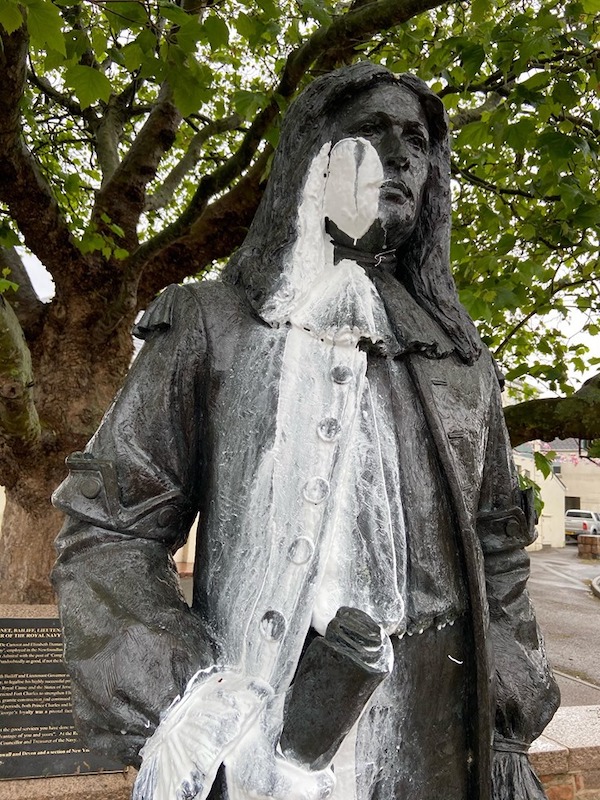
Pictured: The statue of George de Carteret in St. Peter after it was vandalised.
Deputy Tadier is now appealing to the Treasury Minister, Deputy Susie Pinel, to force the States of Jersey Development Company, as shareholder representative, to rename Trenton Square as Benin Square.
He argues the renaming would draw a link with the 302 people Sir George Carteret’s son took from the country to the West Indies.
“Rather than naming one of our public areas after a town in the stolen lands of New Jersey (which itself is named after a slave trader), it would be a fitting tribute to name it after the country from which these 302 slaves were stolen,” Deputy Tadier wrote.
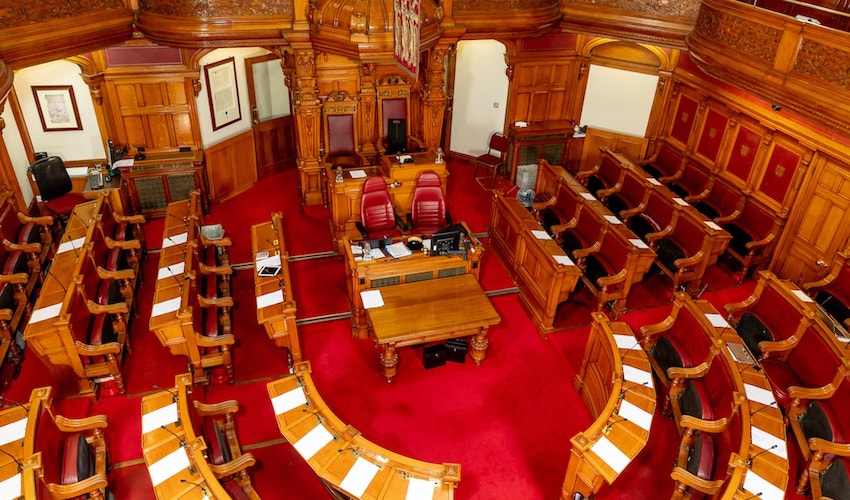
Pictured: Deputy Tadier wants the Assembly to receive a report into a memorial acknowledging Jersey’s part in the Slave Trade before 23 August 2021.
The St. Brelade Deputy also wants to see a memorial acknowledging Jersey’s part in the slave trade to be erected and is asking the Chief Minister to commission a report into this and present it to the States before 23 August 2021.
While Jersey does “a very good job in remembering the forced slave workers of the Occupation”, Deputy Tadier argued the island isn’t as skilled “at mea culpas”.
“In 2014, a time when other maritime towns around the world had long been having the difficult conversations about their monuments and even removing them, or at least updating the narratives of their heroes-cum-villains, someone in Jersey was putting up a statue to a former slave trader,” he added.

Pictured: Deputy Tadier is asking for an audit of all place names and memorials relating to former slave traders in Jersey.
Finally, Deputy Tadier is asking for an audit of all place names and memorials relating to former slave traders in Jersey “in order to inform work on understanding and explaining the full contribution of the slave trade to Jersey’s history”.
This, he suggested, should be done in conjunction with Jersey Heritage, the Jersey Community Relations Trust, Black Lives Matter Jersey and other potential stakeholders.
In the report accompanying his proposals, Deputy Tadier said his third point was not about rewriting history but rather about understanding that “there are histories (plural) and that those histories change depending on who is narrating them.”
“There are those who say that you should not rewrite history, but in this case, the narrative we have allowed to be told is exactly that re-written history,” he said.
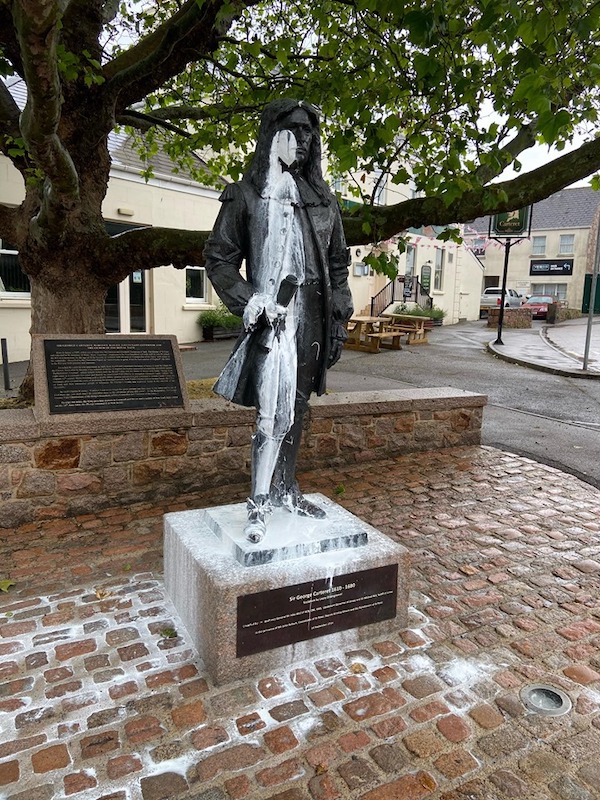
Pictured: Deputy Tadier said Sir George’s statue was a good example of the “whitewashed version” of history.
The Deputy said Sir George’s statue was a good example of the “whitewashed version” of history, as its plaque is “gushing” in its praise and makes no reference to “(De) Carteret’s personal profit from buying, selling and enslaving other human beings”.
“In a sense, it is logical that the plaque contains no balance in this regard,” Deputy Tadier wrote. “We put up statues to heroes (traditionally). Any mention of his negative past would have shown he was not a hero, but a villain to many and would have made such an erection unlikely in the first place.”
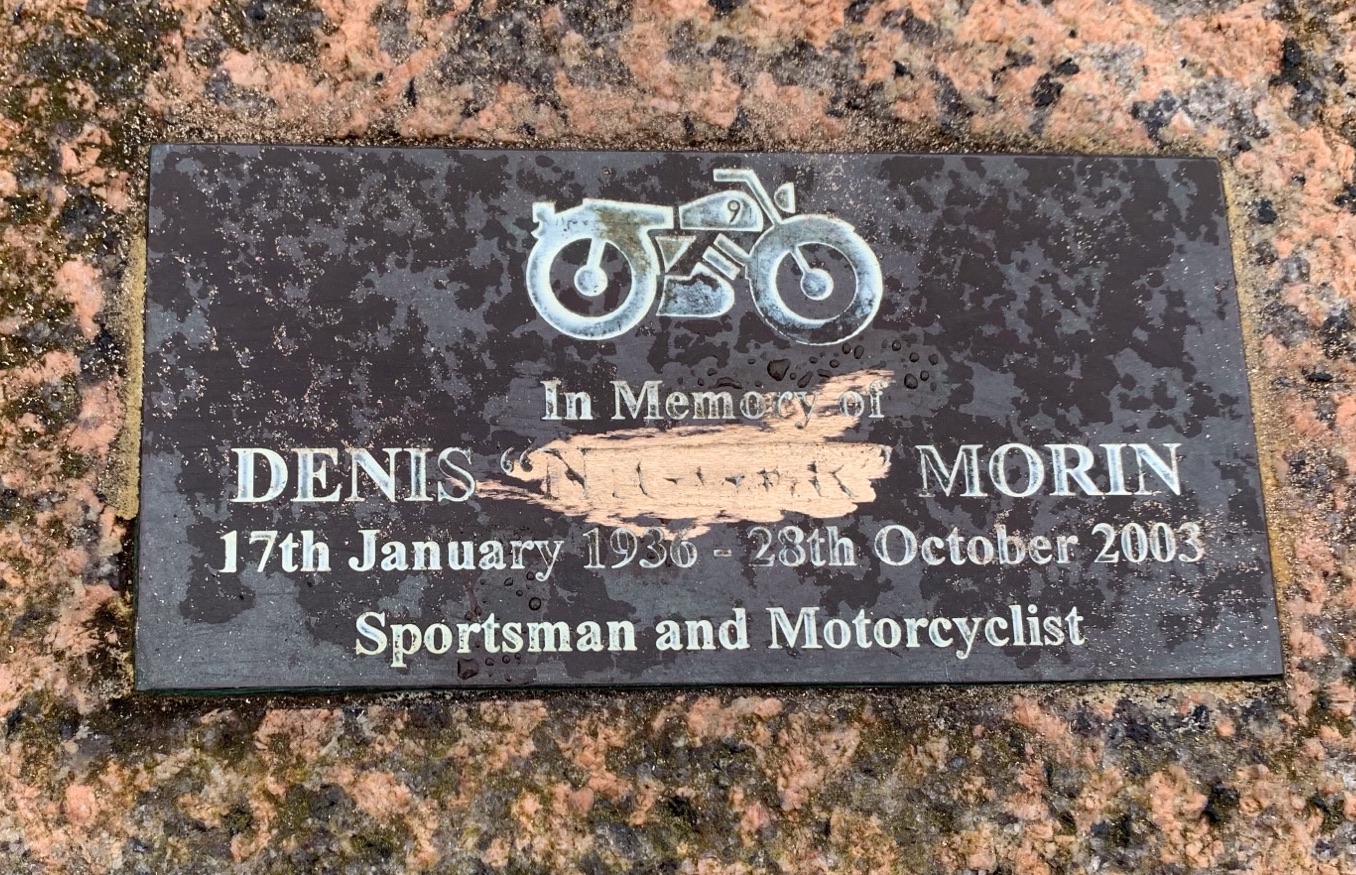
Pictured: A racist term appearing on a public memorial to a local motorcyclist was recently covered up.
The proposals come as several petitions have sprung on the Government’s Petitions page in support of the Black Lives Matter movement,
These include calls for a review of all public statues and monuments linked to former slave traders, the renaming of Trenton Square and calls for Black British history to be taught in schools.
Another petition wants to make the use racist terms on permanent fixtures in public places illegal.
Created by Jade Ecobichon-Gray, it reads: “Standing up against racial injustice comes in many forms and making it illegal to use racist terms on permanent fixtures in publicly-accessible land is one of them.”
It comes after a racist term appearing on a public memorial to a local motorcyclist was covered up after scores of islanders voiced their disapproval at the N-word being on prominent public display.
Ms Gray had called for the plaque’s removal in 2015 but no action was taken in the time.
Reflecting on the episode, Ms Ecobichon-Gray wrote on Instagram: “This is one of so many examples that black and mixed race people here in Jersey deal with on a daily basis.
“This is where the dehumanisation of black people begins. When people feel comfortable using a term that is inextricably linked to the violence and brutality inflicted on black people throughout history, being included as a fond nickname. Let that sink in for a moment. Are you comfortable?”
Comments
Comments on this story express the views of the commentator only, not Bailiwick Publishing. We are unable to guarantee the accuracy of any of those comments.